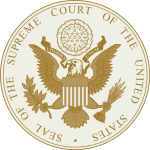Justice Roberts Has A Little List
 The Supreme Court ruled yesterday in Caperton v. A.T. Massey Coal Company that the Due Process Clause of the United States Constitution is violated by the refusal of a judge to recuse herself when the disproportionate campaign contributions of a litigant on behalf of that judge create a serious, objective risk of actual bias. Rick Esenberg has posted on some of the issues raised by the majority opinion here. For me, the most interesting part of the case was actually the dissent by Justice John Roberts. In it, Justice Roberts objects to the uncertainty that federal judges will encounter as they attempt to apply this constitutional right in future cases with disparate fact patterns. In a bit of theatricality worthy of Gilbert & Sullivan, the Chief Justice’s dissent presents a list of 40 questions that the majority opinion leaves unanswered.
The Supreme Court ruled yesterday in Caperton v. A.T. Massey Coal Company that the Due Process Clause of the United States Constitution is violated by the refusal of a judge to recuse herself when the disproportionate campaign contributions of a litigant on behalf of that judge create a serious, objective risk of actual bias. Rick Esenberg has posted on some of the issues raised by the majority opinion here. For me, the most interesting part of the case was actually the dissent by Justice John Roberts. In it, Justice Roberts objects to the uncertainty that federal judges will encounter as they attempt to apply this constitutional right in future cases with disparate fact patterns. In a bit of theatricality worthy of Gilbert & Sullivan, the Chief Justice’s dissent presents a list of 40 questions that the majority opinion leaves unanswered.
The Chief Justice makes a rather stark assertion: “The Court’s inability to formulate a ‘judicially discernible and manageable standard’ strongly counsels against the recognition of a novel constitutional right.” He cites to Veith v. Jubelirer in support of this statement, which of course held no such thing. In fact, as a plurality opinion devoted to the issue of what constitutes a “political question,” the Veith case is a fairly slender reed upon which to rest such a sweeping proposition.

 In my third year of law school, the speaker at our law review banquet was a Boston Globe reporter who talked about a book he was writing on the Robert Bork confirmation battle. I didn’t pay much attention to his speech, other than to complain loudly to all within hearing that a judge would have been a much more prestigious invitee than a reporter. Ethan Bronner’s book, Battle for Justice, came out the following year and has since been recognized as a classic treatment of the modern Supreme Court nomination process.
In my third year of law school, the speaker at our law review banquet was a Boston Globe reporter who talked about a book he was writing on the Robert Bork confirmation battle. I didn’t pay much attention to his speech, other than to complain loudly to all within hearing that a judge would have been a much more prestigious invitee than a reporter. Ethan Bronner’s book, Battle for Justice, came out the following year and has since been recognized as a classic treatment of the modern Supreme Court nomination process.